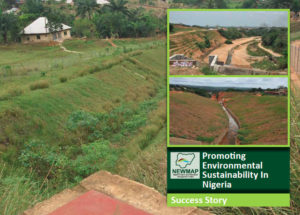By: Adebayo Thomas
The International Union for Conservation of Nature Central and West Africa Programme (IUCN-PACO) organized workshop for Media and Communication Experts on sustainable Land Management practices kicked off with participants from twelve (12) countries of the of the BRICKS Sahel and West Africa Programme advocating for a more robust collaboration and partnership.
The participants also called for support and a network to enable progress through knowledge management on best practices in communication and its tools across the West Africa and the Sahel.
Speaking at the opening ceremony Ms. Bora Masumbimko of the IUCN noted that this regional capacity building workshop of media men and women, and notably the new generation of professionals, on the theme of land and water management was “in line with the implementation of the BRICKS project. This workshop will allow the involvement of media men and women in the efforts towards fighting against land and water degradation and more specifically promoting successful conservation approaches through their wider dissemination.”
The Togolese Minister of Environment and Forest Resources, represented by Mr. Djutonou Folly the Forestry Director in the Ministry welcomed the participants and acknowledged that Media men and women constitute major relays in communication mechanisms are sometimes the only source of not only information, but also education for many people. “It is therefore crucial to make sure that they are trained, informed and sensitized on natural resource conservation in general and SLWM in particular, so that they can fully play their role”. He stated.
The workshop is expected to outline IEC tools that will function well at the grassroots level (local level); how to provide correct and documented information on the causes, consequences, eco-citizen behaviors to be adopted in order to prevent land and water degradation and specifically promote existing conservation approaches. The Lome stay will also provide an opportunity for producing a video on the “Ambassadors” of the Integrated Disaster and Land Management Project (IDLMP) for the Frogleaps site.
The Building Resilience through Innovation Communication and Knowledge Services (BRICKS) project is a six-year regional knowledge and monitoring hub for a large US$1.1 billion regional program of 12 World Bank financed country operations plus related partner-supported activities that together contribute to the region’s and clients’ Great Green Wall Initiative (GGWI) priorities.
BRICKS is implemented by three regional organizations recognized as centers of excellence: the Interstate Committee for Drought Control in the Sahel (CILSS), the Sahara and Sahel Observatory, (OSS) and West and Central Africa Office of the International Union for Conservation of Nature (IUCN).
These organizations facilitate technical knowledge exchanges and monitoring services among the 12 country investment operations in the broader World Bank/GEF Sahel and West Africa Program (SAWAP). Each organization is responsible for implementing discrete activities related to resilient and carbon-smart natural resources management in the Sahel and West Africa region, focusing on biodiversity, crop, range, forest, water resources, and disaster risk management in arid, sub-humid and humid landscapes.
BRICKS was approved by the World Bank Board on September 4, 2013 and the Grant Agreements were signed at a ceremony with the leadership of the respective three Implementing Agencies (CILSS, OSS, and IUCN) on October 15, 2013 in Washington DC. The Project was declared effective on November 26, 2013.
BRICKS Project Components
There are three components organized thematically:
- Knowledge management,
- Program monitoring support, and
- Project management. These are described below.
Component 1 – Knowledge management. This component finances goods, training, operating costs, non-consulting services, consultants’ services, and small-grants to support the following activities:
- Networking country project teams and key stakeholders for structured learning, includes:
establishing a regional decision support web portal,
ii. Identifying and disseminating best practices,
iii. Holding regular south-south learning events, training, and periodic study tours for the 12 SAWAP project teams, - Providing competitive regional innovation small grants for technical assistance to develop information and communication tools,
- Establishing operations services facility for SAWAP projects on key implementation topics related to environmental public goods:
Facilitation and brokering of expertise,
ii. A technical peer review panel,
iii. An operations support pool, - Carrying out a series of regional environmental economic analyses (such as benefit-cost, ecosystem valuations).
- Strategic communication.
Component 2 – Program monitoring support. This component finances goods, training, operating costs, non-consulting services, and consultants’ services to support the following activities:
- Aggregating and benchmarking results and M&E system development support in the SAWAP portfolio of 12 projects.
- Delivering participatory training and expert support on M&E to country project teams. Special emphasis will be placed on measuring biophysical change and carbon flux in land use and management systems in the portfolio, and providing support to country project teams on applying M&E tools.
- Monitoring, modelling and mapping land and water resources and land use change in the regional portfolio, including carbon modelling to help estimate the portfolio’s contribution to climate change mitigation. This includes carbon storage in biomass and soil, as well as changes in GHG emissions due to land use change and management, using existing monitoring and geospatial tools. This activity also includes establishing an inter-agency Geographic Information System (GIS) services team and opportunities for networking and capacity building for project teams and regional actors, development of a regional digital atlas on land and water resources, greenhouse gas (GHG) fluxes from land use and management, and climate risks, and development of a regional data platform to provide near real-time remote sensing data and analyses in appropriate formats to country project teams on the ground.
- Establish and promote an impact evaluation platform.
Component 3 – Project management. This component will finance goods, training, operating costs, non-consulting services, and consultants’ services for all three implementing agencies (CILSS, OSS, IUCN) to provide administrative functions including monitoring of BRICKS activities to ensure that the project remains focused on providing useful and demand-driven services to the project portfolio. The component will establish a Project Coordination Unit hosted by CILSS who will compile and aggregate project fiduciary and results reporting from all three agencies.

